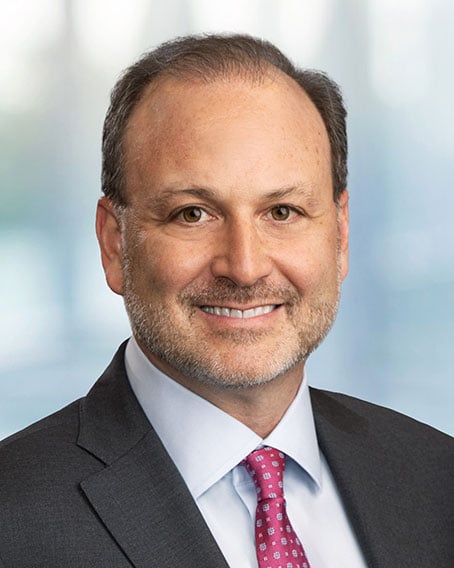Join Ropes & Gray’s life sciences and health care attorneys on a four-part podcast series exploring regulatory, compliance and enforcement changes emanating from Washington, D.C. and the potential impact on life sciences companies in 2023. This third episode will focus on what we except to see in the courts throughout 2023. Topics discussed include litigation challenges against the agencies, enforcement litigation by the government and other matters.
Transcript:
Greg Levine: Hello, and welcome to our 2023 U.S. life sciences regulatory outlook podcast series. I’m Greg Levine, head of the life sciences regulatory and compliance practice group at Ropes & Gray, based in Washington, D.C. Earlier this month, I sat down with several of my colleagues from our Washington, D.C. office to discuss our expectations for the coming year. I was joined by Kellie Combs, Josh Oyster, and Beth Weinman, from our life sciences regulatory and compliance practice group, and Margaux Hall, from our health care practice group. We had a robust discussion that we are releasing as a four-part podcast series. What you’ll be listening to today is part three of that conversation, in which Beth and Margaux discussed what we might see in the courts, including litigation challenges against the agencies, enforcement litigation by the government, and other matters.
Why don't we turn now to talk a bit about what we might see in the courts, whether it's enforcement litigation by the agencies or litigation against the agencies, or any other type of litigation you think will be important in 2023? Margaux, in your world, what do you expect to see on this front?
Margaux Hall: If 2022 was the year of legislative action, I think this will be the year of litigation in the drug pricing arena. There are three areas to watch, in particular. First, litigation challenging accumulators, maximizers, and third-party funders—programs that are dramatically altering the coverage and access landscape for patients in the commercial market. Payors and pharmacy benefit managers continue to use utilization and cost-management controls, especially in connection with higher-cost specialty drugs. The longstanding practices still exist—formulary exclusions, tiering, prior authorization—but there are also newer controls that have surfaced in recent years, including designating separate specialty drug lists that have distinct cost-sharing terms, mandating the use of specialty pharmacies as a condition of accessing drugs, and the proliferation of accumulators, maximizer programs, and third-party funder programs, all of which individually and collectively alter the ways that patients are able to actually access their drugs.
There are several lawsuits that are underway related to these payor and third-party practices, some under the Administrative Procedure Act, and some under sate law. First, along with other patient advocacy organizations, the HIV+Hepatitis Policy Institute is challenging HHS's rules that permit ACA plans to adopt accumulator programs. The plaintiffs have alleged that HHS's policy conflicts with the Affordable Care Act's plain language, conflicts with the Agency's own regulations, and violates the Administrative Procedure Act. Separately, in district court, a manufacturer has brought a lawsuit against a vendor, SaveOnSP, that administers a third-party funder program on behalf of plans and PBMs. The manufacturer alleges that these arrangements deceptively induce plan members to enroll in the manufacturer's patient assistance programs, violating the terms and conditions of those programs, resulting in tortious interference with the contract between the manufacturer and the member, and a violation of New York's deceptive trade practice law. The court recently denied SaveOn's motion to dismiss. Discovery in that litigation is underway and could lend additional visibility into third-party funder practices.
The second category of litigation I'll be watching is 340B litigation. There is ongoing litigation between HRSA and manufacturers over the role of contract pharmacies in the 340B program. In late 2021 and early 2022, four federal district courts vacated HRSA's letters asserting that manufacturers' policies restricting discounts to contract pharmacies violated the statute. More recently, the Third Circuit issued an opinion and order in the consolidated pharmacy cases for Sanofi, Novo Nordisk, and AstraZeneca. The court decided in favor of the manufacturers by concluding that HRSA's manufacturer violation letters were unlawful and that these three manufacturers' restrictions on delivering covered outpatient drugs to contract pharmacies do not violate section 340B. The court enjoined HHS from enforcing against those three manufacturers its interpretation of Section 340B, so this litigation is still underway. Each court, though, has offered slightly different reasoning for its decision. With cases still on appeal and potential differences in the rationale, is it possible that these cases will go up to the Supreme Court? Maybe. I think the 340B litigation will continue to unfold over the course of this year.
Then, finally, there's the big question of: Will we see Inflation Reduction Act-related litigation? I anticipate a lot of scrutiny over Agency decision-making, perhaps even more so since the Agency does not appear to be undertaking formal notice-and-comment rulemaking.
Greg Levine: Thank you, Margaux. Beth, why don't we turn to you? You were yourself a litigator in the Office of the Chief Counsel at FDA. What are you seeing and what do you expect to see in 2023?
Beth Weinman: I was going to focus primarily on what we could expect in the enforcement side, but I think I would be remiss if I didn't just mention a decision that came down just this week in the District Court of D.C. PhRMA had challenged FDA's regulation issued during the Trump Administration to allow the importation of medicines from Canada. The District Court did just dismiss that complaint on standing grounds, finding that, in the absence of an impending approval of an importation program, none of the plaintiffs could show harm. There’s no longer a challenge that's live, so we'll see what happens when the times comes for FDA to approve one of these state importation programs. I think the state of Florida has now started really pushing FDA to go ahead and approve its program, so that's a very recent development that I think we'll need continue to watch.
On the enforcement front, I think every year we can look to the past year as a guide to where enforcement is for the coming year because we don't see huge changes in enforcement priorities. At the end of the day, FDA is tasked with protecting public health and ensuring product safety, and that's where we really get a lot of the enforcement focus. As inspections are increasing, as investigators are back out there conducting inspections, manufacturing practice issues are going to continue to be front and center. Food safety, again, we've seen a lot of attention to food safety—I'm sure we'll talk more later about reorganizations and reformulations of the Human Foods Program because of real concern and scrutiny about whether or not the Agency's doing enough on that front. So, I have no doubt we'll see more attention to enforcement on the food safety front, though FDA has been all over that in the past couple years.
Now that the enforcement discretion period is over on the tobacco front, we started to see more enforcement against the introduction of tobacco products that were required to have, and did not have, approval from FDA, and enforcement was focused mostly on vaping devices. We saw a ton of warning letters, and then, we saw several injunctions in 2022, and I wouldn't be surprised if we see more of that.
Data integrity and transparency with FDA—these issues are always of critical importance to the Agency. When FDA sees, or whistleblowers report, a lack of transparency—whether it's doctoring or fabricating documents in the context of clinical trials, in the context of manufacturing practice GMP records, or if it's in submissions—I think we can expect to see that FDA will take action against companies engaged in that kind of behavior.
I think it is possible we will see COVID fraud cases continue to percolate, involving pandemic products that were supported by the federal government where funding was provided by the federal government, but there were regulatory lapses, and where the government now is saying that federal monies were inappropriately expended. There were a couple subpoenas that were issued—we haven't seen much publicly there, but I wonder if we will see action on that front in the coming year. At some point, the emergency use authorizations are going to be terminated or expire, most likely, and products that don't have regular approvals in place or clearances in place, those products are going to have to be cleared from the marketplace. And presumably, FDA will focus on those that provide the greatest risk to public health, but it's possible we will see—maybe not until the tail end of next year or the beginning of the following year—some enforcement on that front.
I don't think we've moved fully beyond a focus on opioids and controlled substances—that is a favorite target for the Department of Justice. I think we have seen some movement from a focus on manufacturers to a focus on distributors, pharmacies, and health care practitioners that may not be fulfilling what the government sees as their obligations to be prescribing and dispensing these products carefully and in line with accepted practices. These cases may get harder for the government in the aftermath of the Supreme Court's cases in Ruan and Kahn which read a knowledge requirement into the Controlled Substances Act, with respect to the charges that have been favorites against HCPs and, to some extent, against pharmacies. And so, we'll see how DOJ moves forward in the aftermath of those cases.
I think another important area to be focusing on in the coming year are developments involving case resolution and post-resolution compliance. DOJ, from the most senior officials, has been issuing guidance and making statements about the importance of ensuring robust compliance infrastructures. We have alerts on these topics, as well. There is guidance that we expect from the Consumer Protection Branch—which is the department within DOJ that's primarily responsible for enforcement of the Federal Food, Drug, and Cosmetic Act—and we expect guidance from them on self-disclosure in line with Main Justice's guidance on self-disclosure. The Department has talked about how it's really trying to incentivize companies to report lapses, and if they do so, then DOJ wouldn't prosecute. DOJ said it can expect that different departments of DOJ will issue their own policies, and so, with respect to FDA-regulated companies, we're waiting to see one from CPB. I think once that guidance is out, it's going to get tougher for companies that don't take advantage of the self-disclosure incentives. Guidance is also expected from DOJ, with respect to when in case resolutions it expects to be appointing monitors, so it'll be important to be looking out for that.
I'll also just note that the Consumer Protection Branch (CPB) has created a new Corporate Enforcement, Compliance, and Policy Unit. I think that Unit has 13 or 14 dedicated attorneys that are going to be focused on monitoring compliance obligations following corporate resolutions—this is really important. CPB attorneys have announced that we can be looking for template agreements—soon we will be seeing resolutions that will have standard provisions, non-negotiable compliance provisions that they expect most agreements, especially in the non-prosecution and deferred prosecution agreement context, will look like. I think we can expect that there will be non-negotiable provisions on certifications of compliance, on reporting of regulatory violations, and potentially on monitorships. I think this attention to post-resolution compliance, especially in the NPA and the DPA context, raises very important questions as to whether an NPA or a DPA ultimately is the better way to resolve a case rather than a standard plea. I think these are all issues that we'll have to be taking a close look at in the coming year.
Greg Levine: Thank you very much, Beth. That topic that you just mentioned about the non-negotiable provisions and the oversight of some of these resolutions I know is one that's come up in a number of panels—I did one in the spring at the Food and Drug Law Institute, and you did one more recently at the enforcement conference at FDLI. And so, there's lot of issues that are going to need to be worked out on what that's going to mean in practice and how that's going to be administered.
Beth Weinman: Yes, and one thing I didn't mention, but it came up on these panels and was a real hot topic was: Is DOJ going to be stepping on FDA's toes, in terms of post-resolution compliance, especially in cases that involve manufacturing practices and specialized FDA knowledge or policy goals?
Greg Levine: Yes, that is one of the big issues there. Thank you very much to our listeners for tuning in today. We will continue to provide additional news and analysis about regulatory developments and emerging issues from the federal government throughout 2023. You can access that information on our Capital Insights page, on our main Ropes & Gray web page, www.ropesgray.com, by listening to any of our RopesTalk podcasts—including the past episodes in this podcast series—in our podcast newsroom on our website, or by subscribing to RopesTalk wherever you listen to podcasts, including on Apple and Spotify. Be sure to check out part four of this podcast series in the coming days. Thanks again for listening.
Stay Up To Date with Ropes & Gray
Ropes & Gray attorneys provide timely analysis on legal developments, court decisions and changes in legislation and regulations.
Stay in the loop with all things Ropes & Gray, and find out more about our people, culture, initiatives and everything that’s happening.
We regularly notify our clients and contacts of significant legal developments, news, webinars and teleconferences that affect their industries.







